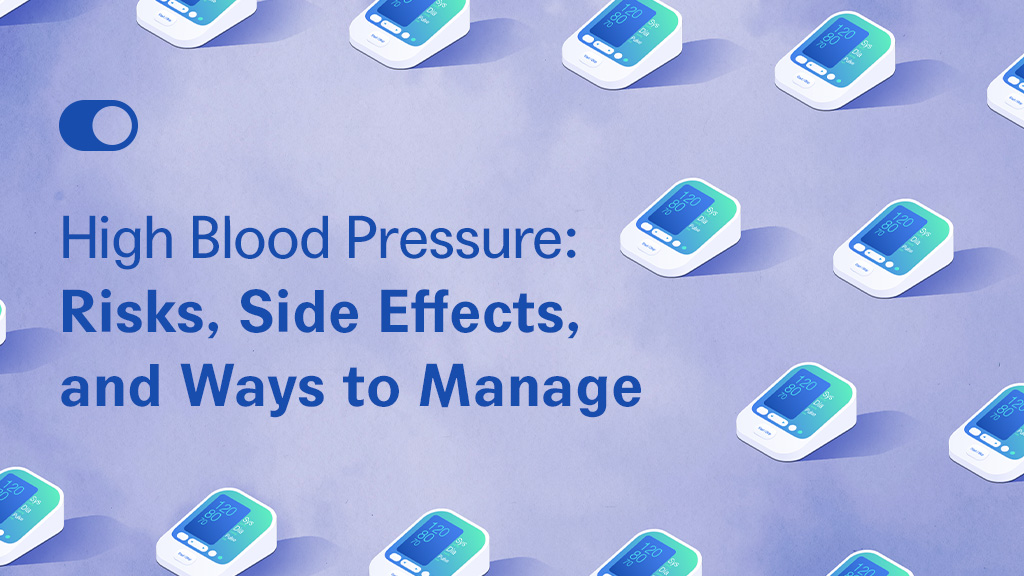
High Blood Pressure: Risks, Side Effects, and Ways to Manage
Nearly half of all adults have high blood pressure, also known as hypertension. It can impact your overall health and put you at risk for heart attack, stroke, or kidney disease. Often, there are no symptoms. That’s why it’s so important to have your blood pressure checked regularly by your doctor. The good news? For many people, lowering blood pressure to a normal, healthy range can be managed with lifestyle changes.
We’re sharing all the hypertension basics—from risk factors to the effects on your body to ways to lower your numbers. (Hint: reducing stress is key.)
Hypertension: Definition and Symptoms
What Is (High) Blood Pressure Exactly?
Blood pressure is the amount of pressure your blood puts on your blood vessels as your heart contracts and relaxes. As you move through the day, your blood pressure changes with your activities. When you have a blood pressure that’s consistently above normal, it’s considered high. (Typically, that’s defined with a reading at or above 130/80 mmHg.)
Your doctor will always check your blood pressure at visits and can tell you if it’s low, normal, or high. If it’s something you need to monitor more closely, you can get a device to use at home.
Hypertension Symptoms and Warning Signs
High blood pressure can be tricky to spot because many people don’t have symptoms. You can have the condition for years without knowing. This can be dangerous. (Get those numbers checked!) Those who do have hypertension symptoms—including people with extremely high blood pressure—may experience:
- Headaches
- Blurred Vision
- Chest Pain
- Dizziness
- Difficulty Breathing
- Nausea
- Vomiting
- Nose Bleeds
- Irregular Heartbeat
- Confusion
- Buzzing In the Ears
How Hypertension Can Impact Your Health
What Does High Blood Pressure Do to Your Body?
Left unchecked, high blood pressure can lead to serious health issues. Over time, arteries can narrow and become less elastic, decreasing blood flow and oxygen to your heart. Along with heart disease, damaged arteries can negatively impact your body in various ways.
Heart Disease
Decreased blood flow to the heart can cause several heart conditions including:
Coronary Artery Disease (Angina): This chest pain can lead to irregular heart rhythms or heart attack.
Heart Attack: With a blocked blood supply and without enough oxygen, the heart muscle begins to die. The longer the blockage, the greater the damage.
Heart Failure: Strain from high blood pressure weakens the heart. Heart failure occurs when it’s no longer able to pump enough oxygen and blood to your organs.
Stroke and Brain Damage
Damaged arteries block or, in some cases, burst, preventing the flow of oxygen to the brain. This causes brain cells to die, triggering a stroke. High blood pressure is also linked with mild cognitive impairment, which can cause trouble with memory or language, and a higher risk of dementia.
Kidney Disease
High blood pressure is one of the most common causes of kidney disease. Damaged blood vessels prevent the kidneys from effectively doing their job: to filter waste from the blood.
Ophthalmic (Eye) Diseases
High blood pressure can impact your vision by damaging the tiny blood vessels in your eyes, causing fluid buildup, or reducing blood flow to your eye’s main nerve.
Metabolic Disorders
People who have both high blood pressure and diabetes often have more serious health problems with their nerves, eyes, and kidneys. Having high blood pressure, high blood sugar, and being overweight at the same time causes metabolic syndrome, which can lead to heart disease.
What Affects Hypertension
What Causes High Blood Pressure?
There are lots of hypertension causes that are related to your lifestyle. These include things like stress, unhealthy diet, lack of exercise, being overweight, and alcohol and tobacco use.
Others who should be aware they may have an increased risk of developing hypertension: people with a family history, those with health conditions like diabetes or kidney disease, and/or folks over the age of 65.
The Connection Between Stress and Hypertension
Whether you’re running late for a meeting or having an intense argument, the body reacts by releasing a surge of hormones. When stressed, your heart beats faster, blood vessels narrow, and blood pressure spikes.
It’s impossible to avoid stress altogether. But chronic or long-term stress tends to lead to unhealthy choices like drinking too much, poor eating, and lack of exercise. Over time, they raise your risk of high blood pressure,heart attack, and stroke.
Lifestyle Changes to Lower Blood Pressure
Lifestyle Changes to Lower Blood Pressure
There are lots of changes you can make to positively impact your overall health, reduce stress, and, in turn, lower your blood pressure.
Sweat It Out: Exercising regularly makes you feel better and strengthens your heart. Be sure to find an activity you enjoy so you stick with it.
Sleep It Off: Quality sleep is key to physical and mental health. Aim for 6-8 hours per night to help stabilize blood pressure.
Keep Stress Down: Easier said than done! Try to remove / lessen stressors—go easy on yourself and seek support from friends or a mental health provider.
Get Your Fruits & Veggies In: A heart-healthy diet can help lower blood pressure. Focus on fruits and veggies and skip or minimize salty, high-fat foods.
Up Your Mindfulness: Relaxation, deep-breathing exercises, meditation, and yoga can be powerful ways to calm the body and mind, and reduce stress.
Our Health Coaches can help you figure out ways to lower stress, improve sleep, and get on track with nutrition and fitness that work for you. And don’t forget to make an appointment with your Primary Care provider to check your blood pressure.
About the Reviewer

A double board certified, patient-focused internist who is passionate about finding the precise diagnosis to the medical problems at hand. Zayd is compassionate and committed to treating the whole person, not the superficial presenting symptoms or outcomes of underlying conditions.